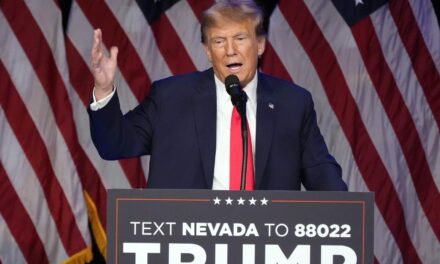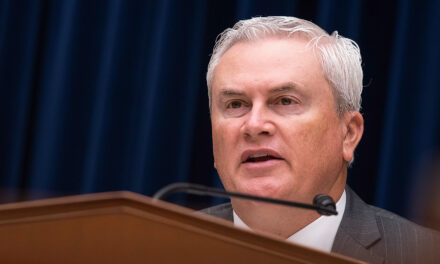We support our Publishers and Content Creators. You can view this story on their website by CLICKING HERE.
The views expressed by contributors are their own and not the view of The Hill
Prabowo Subianto, Indonesia’s president-elect, speaks during the IISS Shangri-La Dialogue in Singapore, on Saturday, June 1, 2024. Prabowo said the only real solution to lasting peace and security for both Israel and Palestine is a two-state solution, and called the ceasefire proposal backed by US President Joe Biden a positive development in helping to bring peace to Gaza. Photographer: Ore Huiying/Bloomberg via Getty Images
Judging from the results of the annual Shangri-La Dialogue in Singapore over the weekend, the United States’ strategy to prevent China from achieving hegemony in the Indo-Pacific region is making progress.
With American support assured, Philippines President Ferdinand “Bongbong” Marcos — the keynote speaker — declared “Filipinos do not yield” to pressure from China. New initiatives were unveiled to deepen trilateral defense cooperation between the U.S., Japan, and South Korea. While to prevent inadvertent escalation in the Indo-Pacific, U.S.-China military dialogue reopened at the top level, after a two-year interlude.
But there is little room for complacency. There remain too many contradictions in U.S. Indo-Pacific policy. Left unresolved they may, over time, push friends toward neutrality and current and potential partners toward something worse. This risk is most salient when it comes to Indonesia.
To appreciate the importance of a nation few in the West understand or study, consider that earlier this year Prabowo Subianto, Indonesia’s current defense minister, won the country’s presidential election with over 96 million votes.
This electoral result alone should be reason for close links between the world’s second and third largest democracies — especially when China strives to convince the global south that Western-style democracy is at odds with their path to economic advancement.
Still, simply holding elections does not make a country a U.S. ally. However, Indonesia is hardly on the fence when it comes to the international rules-based order. When current President Joko Widodo met Joe Biden in November 2023, their joint statement called on Russia to completely withdraw from the territory of Ukraine.
But Prabowo stated in his Shangri-La address that Indonesia’s stance on the Gaza conflict is predicated on adherence to that same international order. He warned of rising disillusionment among many global south countries, hinting at an overlooked but important truth: Indonesia’s principled foreign policy works in favor of U.S. interests in reinforcing a rules-based order in Asia.
To make the country a steadfast partner, there needs to be more give and take on the things Indonesians care about. Both Democrats and Republicans need to prioritize this: The Muslim-majority nation of nearly 300 million is projected to become the world’s fourth-largest economy by 2050. In the geopolitical contest for influence in Southeast Asia, Indonesia is the ultimate swing state.
To align better, the U.S. should start with trade. Unfortunately, the Biden administration’s approach in this policy area risks alienating Indonesia and driving it to closer relations with America’s main competitor. And President Biden’s Inflation Reduction Act (IRA) is the chief spoiler.
The IRA grants tax credits to American manufacturers when critical minerals are sourced from the U.S. or those with which it has a free trade agreement (FTA). But such lavish subsidies conspire to shut nations like Indonesia out of its supply chains. Indonesia has proposed a limited FTA to cover only critical minerals as a workaround. Yet while it hasn’t been outright rejected, it languishes in the U.S. government’s slow lane.
This is a case of shooting oneself in the foot twice. Not only does it push a G-20 economy to deepen economic partnerships with others hungry for its critical mineral output, but it also cuts the U.S. out of the key supply chains it needs to create a homegrown Electric Vehicle (EV) industry. EVs need nickel, and Indonesia has the world’s largest reserves. By 2030, it will account for 65 percent of global supply, and it is looking for partners to help it move up the value chain. The U.S. should seize the opportunity. Then it can source processed inputs from Indonesia so that American consumers can buy EVs made-in-U.S.A. It’s what China calls “win-win.”
Second, the U.S. must work harder on its defense relationship with Indonesia. China has systematically asserted — without any basis in international law — unilateral claims over territorial disputes with Japan, the Philippines, Vietnam and Malaysia. It’s only a matter of time before it sets its sights on Indonesia’s Natuna Islands in the South China Sea.

Given Indonesia’s pivotal location in the Indo-Pacific, the U.S. should enhance its investment in the bilateral work plan on Maritime Security Cooperation. This would gird the archipelagic state’s maritime security and safety capability to protect every inch of its territory and every aspect of maritime economic rights granted by international law. In terms of U.S. Indo-Pacific strategy, a more capable Indonesia is a firmer guard for the Malacca chokepoint and a shield above Australia. There is no time to lose in fully implementing the Defense Cooperation Agreement Prabowo signed with U.S. Defense Secretary Lloyd Austin in November 2023.
Indonesia exemplifies how U.S. policies work at cross purposes to its priorities in the Indo-Pacific. In a fracturing global order and economy, all arms of government must work in the same direction to maintain and develop crucial alliances. The U.S. can start by economically embracing the world’s second-largest democracy.
Philip Shetler-Jones, Ph.D., is a senior research fellow in international security at the Royal United Services Institute (RUSI), the world’s oldest and Britain’s leading defense and security think-tank. His current research is concentrated on Indo-Pacific security.
china
Pacific alliances
US Indo-Pacific strategy
US-Indonesia relations
US-Indonesia trade
Copyright 2024 Nexstar Media Inc. All rights reserved. This material may not be published, broadcast, rewritten, or redistributed.

 Conservative
Conservative  Search
Search Trending
Trending Current News
Current News 





